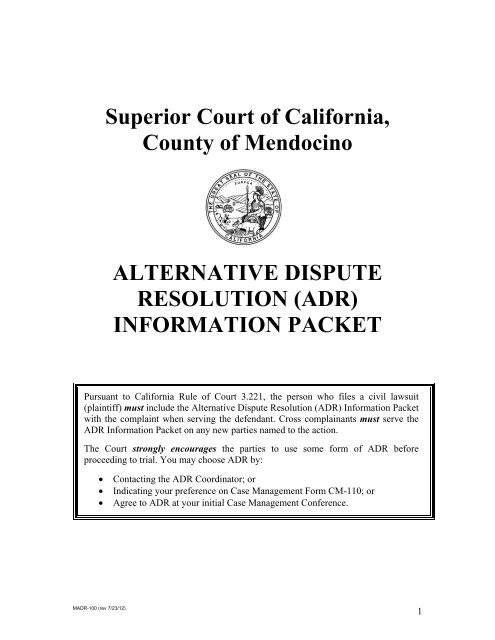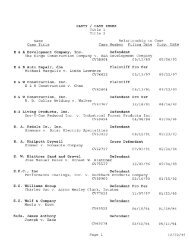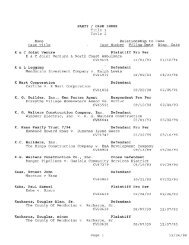ADR - Superior Court, Mendocino
ADR - Superior Court, Mendocino
ADR - Superior Court, Mendocino
Create successful ePaper yourself
Turn your PDF publications into a flip-book with our unique Google optimized e-Paper software.
M<strong>ADR</strong>-100 (rev 7/23/12)<br />
<strong>Superior</strong> <strong>Court</strong> of California,<br />
County of <strong>Mendocino</strong><br />
ALTERNATIVE DISPUTE<br />
RESOLUTION (<strong>ADR</strong>)<br />
INFORMATION PACKET<br />
Pursuant to California Rule of <strong>Court</strong> 3.221, the person who files a civil lawsuit<br />
(plaintiff) must include the Alternative Dispute Resolution (<strong>ADR</strong>) Information Packet<br />
with the complaint when serving the defendant. Cross complainants must serve the<br />
<strong>ADR</strong> Information Packet on any new parties named to the action.<br />
The <strong>Court</strong> strongly encourages the parties to use some form of <strong>ADR</strong> before<br />
proceeding to trial. You may choose <strong>ADR</strong> by:<br />
• Contacting the <strong>ADR</strong> Coordinator; or<br />
• Indicating your preference on Case Management Form CM-110; or<br />
• Agree to <strong>ADR</strong> at your initial Case Management Conference.<br />
1
ALTERNATIVE DISPUTE RESOLUTION<br />
INFORMATION GUIDE<br />
There are Alternatives to Going to Trial<br />
Did you know that most of all civil cases filed in court are resolved without going to trial? Many<br />
people use processes other than trial to resolve their disputes. These alternative processes, known<br />
as Alternative Dispute Resolution (<strong>ADR</strong>), are typically less formal and adversarial than trial, and<br />
many use a problem-solving approach to help the parties reach agreement.<br />
What are the <strong>ADR</strong> Options?<br />
The most commonly used <strong>ADR</strong> processes are Mediation, Arbitration, Neutral Case Evaluation,<br />
and Settlement Conferences.<br />
♦ Neutral Case Evaluation<br />
In Neutral Case Evaluation, each party gets a chance to present the case to a neutral<br />
person called an “evaluator.” The evaluator then gives an opinion on the strengths and<br />
weaknesses of each party’s evidence and arguments and about how the dispute could be<br />
resolved. Although the evaluator’s opinion is not binding, the parties typically use it as a<br />
basis for trying to negotiate a resolution of the dispute. Even if not successful in<br />
resolving the case, Neutral Case Evaluation can lead to use of other <strong>ADR</strong> procedures,<br />
such as arbitration or mediation, especially when undertaken early in the litigation.<br />
Neutral Case Evaluation may be most useful in cases that involve technical issues that<br />
require special expertise to resolve or in cases that the only significant issue is the<br />
amount of damages.<br />
♦ Mediation<br />
Mediation is a voluntary and confidential process where a trained impartial mediator<br />
helps parties in conflict to communicate respectfully and effectively with each other. The<br />
mediator facilitates communication by helping the parties define issues, remove<br />
communication obstacles, and explore potential solutions. Mediation empowers people<br />
to reach informed, acceptable, and realistic agreements.<br />
M<strong>ADR</strong>-100 (rev 7/23/12)<br />
Mediation may be particularly useful when parties have a relationship they want to<br />
preserve. So when family members, neighbors, or business partners have a dispute,<br />
mediation may be the <strong>ADR</strong> process to use. Mediation is also effective when emotions<br />
are getting in the way of resolution. An effective mediator can listen to the parties and<br />
help them communicate in an effective and non-confrontational manner.<br />
♦ Arbitration<br />
In arbitration, a neutral person called an “arbitrator” hears arguments and evidence from<br />
each side and then decides the outcome of the dispute. Arbitration is typically less<br />
formal than a trial, and the rules of evidence may be relaxed.<br />
2
M<strong>ADR</strong>-100 (rev 7/23/12)<br />
Arbitration may be either “binding” or “non-binding.” Binding arbitration means the<br />
parties waive their right to a trial and agree to accept the arbitrator’s decision as final.<br />
Non-binding arbitration means that the parties are free to request a trial if they reject the<br />
arbitrator’s decision.<br />
Arbitration is best for cases where the parties want another person to decide the<br />
outcome of their dispute for them but would like to avoid the formality, time, and<br />
expense of a trial. It may also be appropriate for complex matters where the parties want<br />
a decision-maker who has training or experience in the subject matter of the dispute.<br />
♦ Settlement Conferences<br />
In Settlement Conferences, the parties and their attorneys meet with the judge or a neutral<br />
person called a “settlement official” to discuss possible settlement of their dispute. The<br />
judge or settlement official does not make a decision in the case but assists the parties in<br />
evaluating the strengths and weaknesses of the case and in negotiating a settlement.<br />
Settlement Conferences are appropriate in any case where settlement is an option.<br />
Mandatory Settlement Conferences, ordered by the <strong>Court</strong>, are often held near the date a<br />
case is set for trial.<br />
<strong>ADR</strong> Options Available at <strong>Mendocino</strong> <strong>Superior</strong> <strong>Court</strong><br />
Mediation<br />
Parties may voluntarily participate in mediation at any stage of litigation,<br />
without court referral, by contacting the <strong>ADR</strong> Coordinator.<br />
♦ <strong>Court</strong> Referred Mediation<br />
The <strong>Court</strong> may refer parties to mediation in any civil case, with the exception of family<br />
cases. Once the referral has been made, parties may opt to use a <strong>Court</strong> Panel Mediator or<br />
to hire a private mediator. If the parties elect to use a <strong>Court</strong> Panel Mediator, the a<br />
qualified <strong>Court</strong> Panel Mediator will be assigned through the <strong>ADR</strong> Coordinator. With<br />
<strong>Court</strong> Panel Mediations, there will be no charge to the parties for the first two (2) hours.<br />
If the parties choose to continue the mediation after the two (2) hours, the mediator may<br />
charge his or her regular fee.<br />
What are the advantages of Mediation?<br />
♦ Privacy<br />
All discussions during the mediation are confidential.<br />
♦ Parties Reach Their Own Solution<br />
The mediator will not impose a solution on the parties. The solution is based on the<br />
interests and needs of the parties.<br />
3
♦ No Cost or Reasonable Cost<br />
The cost of participating in mediation is minimal compared to the cost of litigation – or<br />
the cost of doing nothing. There is no cost to parties for mediations conducted by a<br />
member of the <strong>Court</strong> Civil Mediation Panel. If parties opt to use a private mediator, the<br />
Civil Mediation Program Coordinator will help them fine a mediator.<br />
♦ Flexible Scheduling<br />
Mediations can be schedule to accommodate all parties and their attorneys.<br />
♦ Clear, Respectful Communication<br />
Mediation can provide the opportunity for understanding or reconciliation.<br />
♦ Quicker Resolution<br />
Parties are often able to resolve their conflict in one session, though more sessions will be<br />
scheduled as needed.<br />
♦ Effective<br />
Parties know more about the conflict than anyone else does. Developing their own<br />
agreements offers satisfaction and success.<br />
♦ Agreement Options<br />
Any written agreement made in the course of mediation will be treated as a legally<br />
enforceable agreement.<br />
What are the disadvantages of Mediation?<br />
♦ You may go to court anyway.<br />
If you can not resolve your dispute using <strong>ADR</strong>, you may still have to spend time and<br />
money resolving your lawsuit through the courts.<br />
M<strong>ADR</strong>-100 (rev 7/23/12)<br />
4








